

ADHD: Use Deadlines Effectively to Increase Productivity. This week, I had two days of incredible productivity.
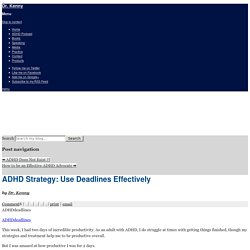
As an adult with ADHD, I do struggle at times with getting things finished, though my strategies and treatment help me to be productive overall. But I was amazed at how productive I was for 2 days. I felt like every moment mattered. I used my time wisely. I made lists and checked them repeatedly throughout the day to make sure that I was on track. How did I overcome my ADHD symptoms so much better on these 2 days? Because I had to… I was getting on a plane on Tuesday night. I had things that had to get done on Monday and Tuesday before I boarded the plane. Most people with ADHD struggle to complete tasks.
“Often does not follow through on instructions and fails to finish schoolwork, chores or duties.” When thinking about adult ADHD, we can look at how this criterion can affect adults. “How often do you have trouble wrapping up the final details of a project once the challenging parts have been done?” Try using deadlines regularly. Work Smarter, Not Harder: 21 Time Management Tips to Hack Productivity. 2839 1836Share Synopsis “Don’t say you don’t have enough time.
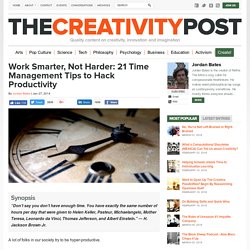
You have exactly the same number of hours per day that were given to Helen Keller, Pasteur, Michaelangelo, Mother Teresa, Leonardo da Vinci, Thomas Jefferson, and Albert Einstein.” ― H. Jackson Brown Jr. Beyond the List: 8 Powerful Ways to Manage Your Tasks. There are so many things you need to do, and so many ways you could keep track of them.
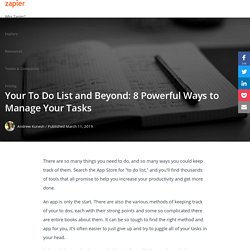
Search the App Store for "to do list," and you'll find thousands of tools that all promise to help you increase your productivity and get more done. An app is only the start. There are also the various methods of keeping track of your to dos, each with their strong points and some so complicated there are entire books about them. It can be so tough to find the right method and app for you, it's often easier to just give up and try to juggle all of your tasks in your head. It doesn't have to be that way. Choosing the Right Task Management Method. Getting Things Done with ADD/ADHD - Dana Rayburn. Eric Tivers How would your life be different if you were getting things done with ADD/ADHD?
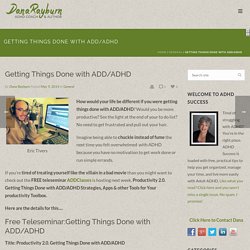
Would you be more productive? See the light at the end of your to do list? No need to get frustrated and pull out your hair. Imagine being able to chuckle instead of fume the next time you felt overwhelmed with ADHD because you have no motivation to get work done or run simple errands. If you’re tired of treating yourself like the villain in a bad movie than you might want to check out the FREE teleseminar ADDClasses is hosting next week, Productivity 2.0. Here are the details for this… Title: Productivity 2.0. Productive Adult ADHD: 20 Tricks to Get Boring Things Done. 50 Tricks to Get Things Done Faster, Better, and More Easily. ADHD & Productivity: 12 Strategies for Getting Things Done. For someone with attention deficit hyperactivity disorder (ADHD), completing a task can be fraught with challenges.
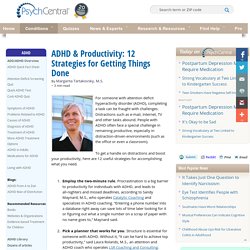
Distractions such as e-mail, Internet, TV and other tasks abound. People with ADHD often face a special challenge in remaining productive, especially in distraction-driven environments (such as the office or even a classroom). ADDitude - Attention Deficit Information and Resources. Getting your life in order is a key step toward reaching your goals.
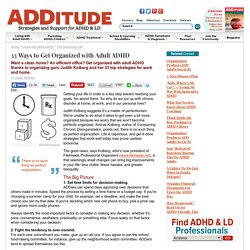
No secret there. So why do we put up with chronic disorder at home, at work, and in our personal lives? Judith Kolberg suggests it's a matter of perfectionism: We're unable to do what it takes to get even a bit more organized because we worry that we won't become perfectly organized. And as Kolberg, author of Conquering Chronic Disorganization, points out, there is no such thing as perfect organization. Life is capricious, and get-it-done strategies that work well today may prove useless tomorrow. The good news, says Kolberg, who's now president of FileHeads Professional Organizers (www.fileheads.net), is that seemingly small changes can bring big improvements in your life--less clutter, fewer hassles, and greater tranquility.
The Big Picture.
Mental. Physical. Habits: How They Form And How To Break Them. Routines are made up of a three-part "habit loop": a cue, a behavior and a reward.
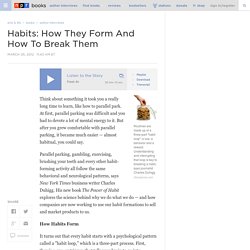
Understanding and interrupting that loop is key to breaking a habit, says journalist Charles Duhigg. iStockphoto.com hide caption itoggle caption iStockphoto.com Think about something it took you a really long time to learn, like how to parallel park. At first, parallel parking was difficult and you had to devote a lot of mental energy to it. Parallel parking, gambling, exercising, brushing your teeth and every other habit-forming activity all follow the same behavioral and neurological patterns, says New York Times business writer Charles Duhigg. How Habits Form It turns out that every habit starts with a psychological pattern called a "habit loop," which is a three-part process. "Then there's the routine, which is the behavior itself," Duhigg tells Fresh Air's Terry Gross. The third step, he says, is the reward: something that your brain likes that helps it remember the "habit loop" in the future. 4 Rules For Becoming Debt Free By Age 30.
Self Confidence to Bring out the Best in You. 24 Surefire Ways to Get Your Mojo Back. “Mojo” refers to your self-confidence, self-esteem, self-efficacy, or even sex appeal.

Dr. Evil–Austin Powers’ nemesis in the Austin Powers film series–defines mojo as follows: “The libido, the life force, the essence, the right stuff, what the French call a certain, ‘I don’t know what’”.